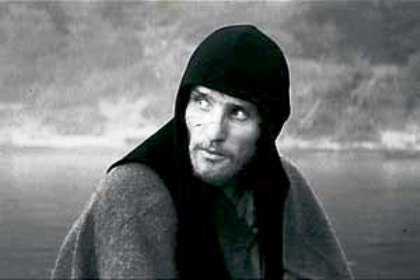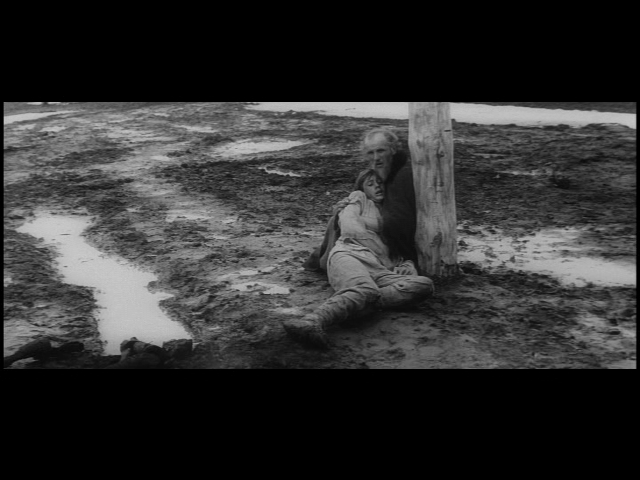Rublev Fasts
Andrei Tarkovsky’s epic film, The Passion of Andrei Rublev (1966) is a Lenten film par excellence. It depicts the spiritual struggle of one of Russia’s great cultural heroes, the painter of icons Andrei Rublev (1360-1430), who is most famous for his stunningly original, The Holy Trinity (c. 1420). Although I wrote about the movie here at CULTIVARE a few months ago (“Art and Grace“), it continues to shape and challenge my thinking about art and faith.
Tarkovsky narrates Rublev’s spiritual crisis brought on by a call from the Trinity Lavra of St. Sergius outside of Moscow, the spiritual center of the Russian Orthodox Church, to paint an icon of the Trinity. Rublev resists. He believes his crisis of faith, his struggle to reconcile the love of God with the evil and brutality which he has observed in the world and in his heart, disqualifies himself to paint icons, to open heaven through paint.
And so Rublev fasts.
He fasts from speaking. He fasts from community. And he fasts from his vocation.
As he wanders the Russian countryside wrestling with his disbelief and denying his vocation, he comes upon a young boy, Boriska, who is involved in another kind of vocational struggle. His father, a bell maker, has just died, forcing upon him the responsibility to finish the casting of a bell for a village church. The boy, desperate to achieve recognition from the townspeople and the Prince who commissioned the bell, risks his life by claiming to have been given the secret of bell making by his father.
But Boriska has lied. He doesn’t have the secret. His father withheld it from him, or so he believes. Yet Boriska risks his life to cast the bell. (We learn that because of the cost of the project, the Prince will kill Boriska if he fails.)
Rublev watches Boriska, alone, from a distance in silence.
Boriska succeeds. He casts the bell for the village. But he collapses from exhaustion, grief, and anguish. His father has died. He has taken the secrets of bell making to his grave, leaving the young boy alone—a son with no father, a vocation with no knowledge.
Breaking his fast to comfort the suffering boy, Rublev vows to break another fast,
“We will go to the Trinity Monastery, and you will make bells and I will paint icons.”
Rublev recovers his vocation and a new insight into his faith by breaking his fast to offer Boriska a word of comfort and a promise.
For all of his self-discipline and ascetic rigor, Rublev recovers his vocation through love of his neighbor.
Rublev is Freed
Lent is an observance that reveals our weakness and failure in remarkable ways. Each year we vow to “keep” it better, each year we fail, often in unexpected ways—either in the mounting sense of pride we experience in our self-sufficiency, dedication, and discipline or in the despair that our failures somehow reveal God’s true assessment of us.
And so it is appropriate to consider vocation during this most sensitive time of the year, a time in which are reminded that we are unable to set aside those things that so easily ensnare us, like food, drink, Twitter, and sin. Lent reminds us that the Christian, as Martin Luther says, “lives not in himself, but in Christ and neighbor,” in Christ through faith and in the neighbor through love. Lent reminds us just how much we live in ourselves. And our work is one of the most explicit ways in which we do so.
We are trained in the church to think about the work that we do—our vocation—as a means by which we please, honor, or otherwise show God our gratitude. In short, we are trained to regard our work as a form of justification before God—to make God love us or to keep him loving us. Our work is a matter between God and us—it’s a private “spiritual” affair—a matter of “worship.”
Yet the work that we do is unable to justify us. Because we are justified by faith, apart from works (Rom. 3. 28) God doesn’t need our work. But, as Gustaf Wingren observed in his ground-breaking study, Luther on Vocation (1942), even though God doesn’t need our good works, our neighbor does.
For Luther, the doctrine of justification freed the Christian to work not for God but for his neighbor. It freed the Christian to be content to make a good shoe and sell it at a fair price. Our vocations, the work that we do, whether coaching a football team, shuffling papers, or painting pictures, exists for our neighbor. Vocation is, then, merely the outgrowth of the implications of the doctrine of justification. For justification by faith is the means by which we live in Christ and vocation is the means by which we live in our neighbor.
This is especially difficult for artists to understand. They’ve been trained to think about art as a private, devotional, priestly affair, the result of a special encounter with God. But Rublev’s breakthrough occurs when he discovers his neighbor—not God—in his vocation. Through Boriska—observing and comforting him and promising to care for him as a father—by being Christ to his neighbor, as Luther once said—Rublev receives his vocation anew. He receives it liberated of the burden to justify himself through paint before the face of God.
Sitting in the mud with a broken, grieving orphan, Rublev is truly free.
He is free to paint icons.
May God use this season of Lent, and the failures it brings, to set us free to see the face of our neighbor.













